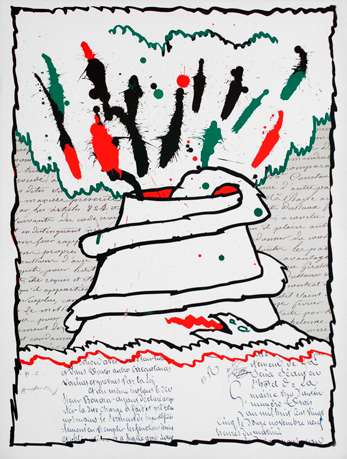Fr : version française / En: english version
On earth as it is in heaven
Fire's natural manifestations are brutal and violent. Natural fire, whether celestial or telluric, conjures the wrath of Zeus/Jupiter/Thor or Hephaestus (Vulcan). From the magical, thunderbolt-firing weapon of Zeus's shield—about five million lightning bolts strike the earth each day—to terrifying volcanic eruptions such as Krakatoa and its global social and demographic repercussions, natural fire reminds us of our humble condition.
Flowers of Fire
In ages past, since Chaos' mighty throes,
This crater's pit its flaming brood unchained,
Till grandly lone its fiery plume attained
A loftier height than Chimborazo knows.
Yet silence here with muffled footstep goes,
The bird now slakes his thirst where cinders rained,
While earth's congealed blood, lava, has constrained
The soil to deep, inviolate repose.
Yet,-act supreme of fire in time of old,-
Within the crater's mouth forever cold,
Making the comminuted rocks to glow,
Like peal of thunder in the silence rolled,
Standing in pollen dust of powdered gold,
The flame-born cactus opens its gorgeous blow.
José-Maria de Heredia, Sonnet from The Trophies
Translated by Edward Robeson Taylor, published by Bibliophile
Caught between these forces beyond our control, humankind can only behave itself and venerate the appropriate gods...





























